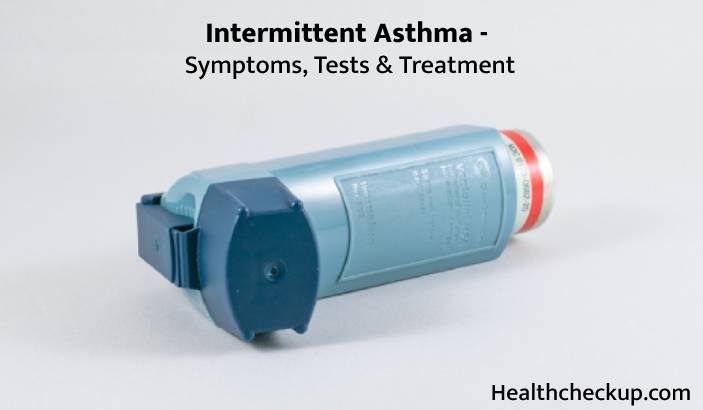Usually, Asthma is associated with allergies. The medical term is ‘Bronchial Asthma’.
Apart from allergies, bronchial asthma can also be caused by tobacco smoking, passive smoking, recurrent respiratory tract infection, post TB, and hereditary & genetic causes.
There are also many types of asthma.
Intermittent Asthma, also known as Mild Intermittent Asthma is one type of asthma.
Generally, on the basis of symptoms frequency, we can decide whether this asthma is intermittent or not.
What is Mild Intermittent Asthma
Mild Intermittent Asthma is a type of asthma in which patients can have symptoms fewer than 2 days a week and night flares fewer than 2 nights in a week.
Pathophysiology
Asthma causes inflammation in the airways. It also causes bronchoconstriction (narrowing of windpipes).
Symptoms
Common respiratory symptoms of mild intermittent asthma are cough, chest tightness, breathlessness, wheezing from the chest, chest heaviness, chest pain, etc.
How to Diagnose Intermittent Asthma
Any patient with the above chief complaints should visit a Chest Physician or a Pulmonologist.
The pulmonologist will ask for a certain history like allergies, family history, past history of lung infection, etc.
Then he /she will examine your lungs through a stethoscope. If he suspects asthma, he will request a few reports to confirm the diagnosis of asthma.
Investigations Needed For the Diagnosis
- Blood investigations – CBC (complete blood count) with AEC (absolute eosinophil count) as high eosinophil can be seen with allergic Asthma. Serum IgE level – is a more specific test for allergy.
- Chest x-ray – This is basically to rule out other lung diseases. Usually in Intermittent Asthma, a chest x-ray is normal.
- Pulmonary Function Test (PFT) – This is the most important test for the confirmation of asthma.
With the help of PFT, we cannot only diagnose asthma but we can also identify the severity of asthma, and newer treatment guidelines are based on PFT severity. - Allergy Testing – Skin Prick Test (SPT) – If eosinophil counts are high in CBC with elevated IgE level, these patients can undergo detailed allergy testing to identify the allergens causing the symptoms. Once we identify the allergens, we can advise patients to stay away from those allergens.
Treatment of Mild Intermittent Asthma
According to GINA (Global Initiative for Asthma) guidelines, treatment of asthma is based on PFT severity. We can broadly classify asthma as Mild, moderate and severe.
The mainstay of treatment is inhaled corticosteroid (ICS), Inhaled bronchodilators ((LABA and LAMA), oral anti-allergic (montelukast), oral antihistamine (levocetirizine or fexofenadine) and oral bronchodilator (Acebrophylline).
- Inhaled Corticosteroid (ICS) –
It is the best treatment for asthma. Commonly used ICS is budesonide and fluticasone. They are anti-inflammatory in nature, so prevent allergic inflammation in the lungs. Inhaled steroids act locally and directly on the lungs without affecting other body organs. So they are safe in long-term use without systemic side effects like diabetes, hypertension, osteoporosis, retinal damage etc. - Inhaled Bronchodilators –
They act on bronchoconstriction. These medications will dilate the Airway smooth muscles and relieve bronchoconstriction. There are two types of bronchodilators. LABA (long-acting beta 2 agonists) and LAMA (Long-Acting Muscarinic Antagonist). Commonly used LABA are Formoterol and Salmeterol. Commonly used LAMAs are tiotropium and Glycopyrronium. - Oral anti-allergic –
Montelukast is the drug of choice to prevent allergy, especially in those patients whose AEC and IgE are high. - Antihistamine –
Levocetirizine and fexofenadine are commonly used antihistamine drugs. They are usually given for symptomatic relief like a cough. - Oral bronchodilator –
In severe cases, we have to give systemic bronchodilators like Acebrophyllin, Theophylline, and Etophylline along with inhaled bronchodilators
So in summary, mild intermittent Asthma is easily manageable with inhaled medications. You need to visit a Chest physician for PFT and clinical examination. If you ignore this condition or don’t take proper medication, it will end up in chronic persistent asthma or status asthmaticus (asthma Attack).

Dr. Kaushal M Bhavsar pursued his MD in Pulmonology. He is an Assistant Professor in Pulmonary Medicine, GMERS Medical College, Ahmedabad








